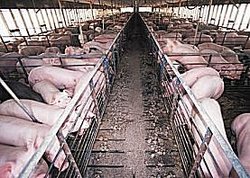Witnessing agriculture's "industrial jungle"
 Barbara Rimer, dean at the University of North Carolina's Gillings School of Global Public Health, traveled to Duplin County, N.C. earlier this month to learn about industrial animal production and its impact on communities.
Barbara Rimer, dean at the University of North Carolina's Gillings School of Global Public Health, traveled to Duplin County, N.C. earlier this month to learn about industrial animal production and its impact on communities.What she saw there left her, in her own words, "sad, angry and shocked."
Rimer described the disturbing experience of witnessing modern industrial agriculture's "concentrated animal feeding operations" or CAFOs in a recent post to her "Monday Morning" blog, prefacing it with a warning that some of the text "is graphic and may be disturbing." She reported:
We flew over Duplin County. As far as the eye could see, there were hog lagoons and low slung buildings that house thousands of hogs and chickens. From the air, we could see how hog waste is sprayed onto fields, how the effluent runs into ditches that run into creeks that lead to rivers, including the Neuse, and pollutes all it touches. We saw how close the spray would come to neighboring houses and could imagine how the wind would blow that disgusting liquid onto yards and even into houses. It felt like we had traveled back in time to the 19th or early 20th century, before modern means of waste disposal were used. Think of CAFOs as factories, like what Upton Sinclair wrote about in The Jungle. These aren't the bucolic farms of yesterday. Animals are raised strictly as products, crammed together in inhumane conditions, raised only to be slaughtered. There's nothing noble about CAFOs.Rimer's tour group also included Steve Wing, a UNC epidemiologist who studies hog farms' human health impacts; Jim Merchant, the former dean of the University of Iowa College of Public Health; and Rick Dove of the Waterkeeper Alliance. As Facing South reported recently, Merchant came to North Carolina earlier this month to address the state legislature on the health impacts of industrial hog farms only to have the hearing adjourned before he had a chance to speak.
After flying to Duplin County, Rimer's group was met by Devon Hall, co-founder of the Rural Empowerment Association for Community Health based in Warsaw, N.C. Hall took the group on a driving tour to show them how close the massive hog operations are to people's homes and drinking-water wells. Writes Rimer:
We stopped along the way to take pictures of the contents of a "dead box." A dead box is one of many dumping grounds for carcasses of dead animals. Earlier that day, I'd never even heard of a dead box, and now it is forever etched into my memory.Rimer noted how important UNC's research is to understanding the impact industrial livestock farms have on human health -- and she vowed to figure out how her school can be most helpful.
In the meantime, environmental advocates are asking North Carolina Gov. Beverly Perdue (D) to convene a task force to examine the environmental, human health and economic impacts of industrial production of hogs and other livestock. They've launched an online petition to Perdue that they're asking supporters to sign; to read it and add your name, click here.
Tags
Sue Sturgis
Sue is the former editorial director of Facing South and the Institute for Southern Studies.
